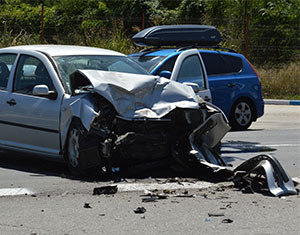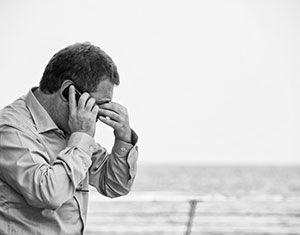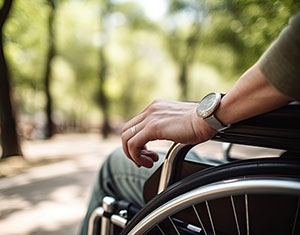Atlanta Spinal Cord Injury Attorney Representing Victims of Severe Spine Damage
Stephen D. Apolinsky and our Atlanta spinal cord injury attorneys have successfully recovered compensation for individuals who sustained serious injuries to their spine. Over the past 32 years, we have recovered over $60 million for our clients and their families, including many cases involving clients who suffered spinal cord injuries and paralysis due to the negligence of others.
We understand the overwhelming pain and suffering (both physical and mental) that comes with a spinal cord injury. If you have been hurt, our firm will work tirelessly to secure the financial compensation you and your family need to begin moving forward from this life-altering event.
What is a Spinal Cord Injury?
The spinal cord is the body’s “command center,” sending messages throughout the body. It’s protected by the spine and a series of vertebrae, forming a hard, protective cover against the soft interior. Damage to this spine or spinal cord can cause debilitating injuries that lead to partial or complete disability. The messages can’t travel to the rest of the system correctly, leaving a person partly or wholly paralyzed.
Even with great advances in medical treatment, most spinal cord injuries have no cure. This means that a victim will have to live with the repercussions for the rest of their lives. They may never be able to return to their former way of life, including returning to work.
If you sustained a serious spinal cord injury, you are entitled to financial compensation for the full value of your damages. Our legal team can help you secure compensation. As leading spinal cord injury attorneys in Georgia, Apolinsky & Associates, LLC, offers free and confidential consultations to those interested in more information about their legal rights after a spinal cord injury.
Further Reading: Understanding Proximate Cause in Negligence & Personal Injury
Long-Term Impact of Spinal Cord Injury
Any injury to the spinal cord directly impacts a person’s mobility and other essential functions, including:
- Employment
- Everyday activities such as eating, driving, and personal care
Most people consider the immediate impact of this injury, such as paralysis. But over time, a spinal cord injury victim can develop secondary conditions, such as:
- Bladder and other infections
- Kidney stones
- Breathing difficulties
- Digestive impairment
- Loss of sensory and motor control
- Osteoporosis
- Muscle spasticity
- Syringomyelia, numbness, and weakness in the extremities caused by a cyst or cavity forming inside the spinal cord
- Mental conditions such as depression or anxiety exacerbated by paralysis and other illnesses
These conditions can add to the already high cost of care throughout the victim’s lifespan. Without compensation, a spinal cord injury patient may never have any type of treatment or recovery available.
If you or a loved one have suffered spinal cord injuries in Georgia and would like to know what damages you may recover as part of your case, contact Apolinsky & Associates, LLC, for a free case evaluation.
Further Reading: Common Types of Catastrophic Injuries Due to Negligence
Proving Negligence & Causation in Spinal Cord Injury Cases in Georgia
The first step after any accident involving the spinal cord is to seek immediate medical attention. Documenting your injury from the earliest stages, from the initial emergency assessment to follow-up care, is crucial to supporting your case.
Under GA Code § 9-3-33, the statute of limitations holds that injured parties have two years to bring personal injury claims forward. After two years, a court will dismiss your claim. Oftentimes, insurance companies will engage in stalling techniques to avoid paying you anything. It is important to begin working with a Georgia personal injury attorney experienced in dealing with spinal cord injury claims as soon as possible to build your case.
Regardless of the accident that caused you to suffer a spinal cord injury, proving your case is essential to winning and getting fair compensation. In order to do so, you will need to establish negligence by showing that:
- A duty of care existed, and the defendant owed you a level of responsibility
- The defendant breached the duty of care and responsibility
- That breach directly caused your spinal cord injuries
- You suffered damages that resulted from the breach of care
The evidence you present in your spinal cord injury case, including medical records, should prove all four of these elements. Photographs, police reports, earnings statements, and other relevant documentation should demonstrate the defendant’s breach of duty. Forensic evidence, such as video surveillance and witness statements from the scene of the accident, will support your case as well.
Compensation & Damages Recoverable for Victims of Spinal Cord Injuries
For those suffering from a spinal cord injury, claims will often focus on the long-term effects as well as the individual’s ability to continue working and lead an independent life. Your Atlanta spinal cord injury attorney will work with you to fight for compensation for the full value of your losses, including financial recovery for:
- Current medical bills.
- Future medical costs.
- Any in-home care that may be required.
- Physical rehabilitation.
- Required medical equipment and devices.
- Long-term disability.
- Lost wages.
- Loss of future earning potential.
- Mental anguish.
- Loss of lifestyle enjoyment.
For your surviving spouse, there may be a viable claim for loss of consortium. This is a type of claim meant to provide compensation for the damage to a married couple’s quality of life due to the serious injury or death of a spouse.
This falls into the general damages category of a case, and is based on the claimant’s right to the companionship, love, society, affection, services, and intimacy of the marital relationship. It is common to claim loss of consortium in Georgia spinal cord injury cases.
Further Reading: Understanding Negligence Per Se in Georgia Personal Injury Cases


















